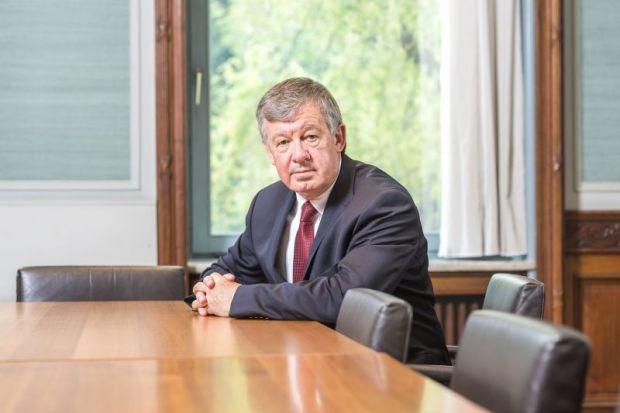Michael Murphy will never forget the moment he stood in a hotel room at Heathrow airport reading a paper on the epidemiology of an as-yet-unnamed respiratory illness in central China. As president of the European University Association (EUA), he had been on his way to Prague to meet with the Czech rectors’ conference.
But when he had finished reading, he changed his plans. He cancelled his ticket and booked a flight back to Cork. He also emailed a link to the paper to Micheál Martin – then leader of the opposition in Ireland, who would go on to serve as the nation’s prime minister through the worst years of the Covid-19 pandemic – arguing that the education sector should be shut down immediately.
As a consultant physician and professor of clinical pharmacology at University College Cork (the institution he formerly led), he was in a good position to make such a case. As he prepares to step down as EUA president at the end of June after a four-year term, he credits Europe’s largely liberal, democratic model for getting him there.
“I was born in 1953 in, at that time, the poorest country in Europe, in a house without electricity, running water or an indoor toilet,” he told Times Higher Education. “In Europe, we’re lucky to be able to say that a life journey has got lots of freedoms and opportunity.”
For him, the invasion of Ukraine was the saddest moment of his presidency, and when Russian rectors refused to condemn the war, the EUA suspended their memberships – a move in keeping with the remarkably united response across a diverse continent.
“Russia, which has such a superb level of participation in higher education, has not been able to ensure that the content of that education imbues people with the values of Europe,” Professor Murphy said.
His proudest achievement as EUA president was the speedy adoption of “Universities without walls”, the association’s 10-year vision for the sector, which, he said, landed on desks in time to influence the European Commission’s own higher education strategy.
If he had his term again, Professor Murphy said, he would spend more time in Europe’s capitals, helping to fortify the national rectors’ conferences that make up the backbone of the EUA’s membership of more than 800 universities.
“For the sector in Europe to be more effective and more impactful, the national rectors’ conferences really need to be strengthened in many countries,” he said, emphasising the value of cooperation and joint positions nationally and across the bloc.
The EUA has historically had “a lot of focus” on working with the European Commission, he added, but it was now clear to him the European Union’s ministerial councils have “greater clout” and that their members come to Brussels “with their minds made up”. More closely coordinated conferences could be more effective in changing minds at home and, thus, better at representing the university viewpoint in Brussels, he thinks.
That job now falls to Josep Garrell, former rector of Spain’s Ramon Llull University, who will become EUA president in July. Professor Murphy’s advice to his successor is to “deploy your personal skill set, rather than reading books on leadership. In other words, lead by the seat of your pants.”
Exhorting a university leader to wing it is somewhat ironic given that his greatest regret from his tenure is not having made more progress on an EUA leadership training programme for rectors and presidents. The idea seems finally to be gaining momentum after pandemic disruptions, and Professor Murphy said the European education commissioner, Mariya Gabriel, had “expressed keen support” for it, which he hopes might lead to some EU funding.
“In this new, complex world, the divine inspiration that was historically viewed to accompany being elected as a rector is not sufficient,” Professor Murphy said. “Formal development and training is absolutely fundamental if we are to be as effective as we have to be, as quickly as we need to be.”
Between his undergraduate degree at Cork and his return to teach medicine there, Professor Murphy taught at the University of Chicago, going on to lead the National Institutes of Health fellowship programme in clinical pharmacology. He has spoken highly of his time in the US, but leading the EUA has helped him to appreciate that the solutions to problems in health or university leadership can come from a range of universities: “Great ideas are not the preserve of larger countries, or wealthier countries; they can be found everywhere.”
After a few decades in academic leadership, including as dean of medicine and president of Cork, Professor Murphy is happy to make a switch to advising others instead: “I’m available to share my learnings and ignorances lavishly.”
ben.upton@timeshighereducation.com
This is part of our “Talking leadership” series with the people running the world’s top universities about how they solve common strategic issues and implement change. Follow the series here.
Register to continue
Why register?
- Registration is free and only takes a moment
- Once registered, you can read 3 articles a month
- Sign up for our newsletter
Subscribe
Or subscribe for unlimited access to:
- Unlimited access to news, views, insights & reviews
- Digital editions
- Digital access to THE’s university and college rankings analysis
Already registered or a current subscriber? Login








